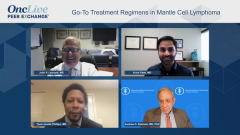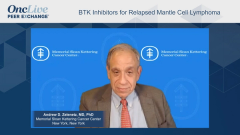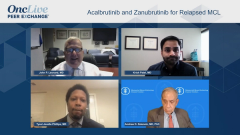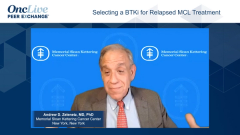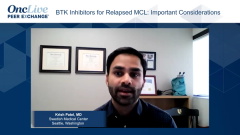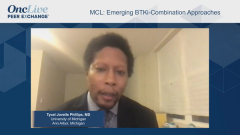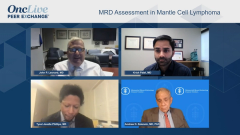
BTK Inhibitors for Relapsed MCL: Important Considerations
Episodes in this series

John P. Leonard, MD: Tycel referenced 1 thing earlier and that was CNS [central nervous system] penetration and potential use. We’ll probably be seeing more occasional CNS involvement with mantle cell lymphoma in people who are living longer. Do you want to comment on a BTK [Bruton tyrosine kinase] inhibitor? I know that’s not the central use of a BTK inhibitor, perhaps. But at least for CNS penetration, how do you think about it for those cases where it might be a factor in a patient, Tycel?
Tycel Jovelle Phillips, MD: We know from various data, especially from CNS lymphoma, that ibrutinib penetrates into the CNS. There was a recent abstract from the French that actually compared ibrutinib with high-dose methotrexate and some of the other agents that we use for CNS prophylaxis in mantle cell lymphoma. And the ibrutinib actually looked better. Given that, I just don’t know necessarily the penetration of the acalabrutinib and zanubrutinib. That’s not to say that they don’t get into the CNS; I just don’t know.
I tend to have situations where there is concern for CNS involvement. I will tend to resort to ibrutinib just out of the assurance that I know that the drug is also going to get into the CNS, and if the patient responds systemically, I’ll also get some CNS control. It’s 1 of the things that until further data come out with the other agents that I’ll use to help discriminate picking from the 3.
John P. Leonard, MD: I don’t want to call it a pearl, but 1 tidbit that is worth mentioning because it does occasionally come up: Krish, you mentioned that second line is the most common place where you’re using a BTK inhibitor. What are the other factors that come into this. Is it molecular information, clinical data, the patient status? What figures into when you use it and which 1 you might use?
Krish Patel, MD: Often I will use it as a second line, so I think that applies equally to all 3 that are available. In terms of selecting from the 3—zanubrutinib is the newest—comorbidities in particular and medications that the patients are taking, as Andy and Tycel mentioned, are particularly important. For my patients who have cardiac comorbidities, or a history of atrial fibrillation [AFib], or are on medications that increase their bleeding risk, I feel much more comfortable with a second-generation BTK inhibitor. For patients who have been on ibrutinib already, those aren’t patients that I would switch their therapy if they’re tolerating it well for mantle cell lymphoma. But it’s nice to have alternatives available. It’s much more about comorbidities and medications in terms of the selection from the 3 because we don’t have any comparative data.
The other thing I’ll mention is that when we see patients who have high risk or ultra-high-risk mantle cell lymphoma in the relapsed setting, 1 thing that Andy mentioned earlier that is very important to reflect on is that while the BTK inhibitors are active in patients with TP53 aberrations, the duration of response tends to be a lot shorter. For that patient I’m picking a BTK inhibitor, but I’m also picking an exit strategy. What’s going to be the next step for that patient? In our practice that is often going to be a CAR [chimeric antigen receptor] T cell, whether that’s a Tecartus trial or some other cellular immunotherapy.
John P. Leonard, MD: Andy, any other factors for you as far as selecting a BTK inhibitor?
Andrew D. Zelenetz, MD, PhD: No, we covered the different aspects pretty well. I agree that the drug we know gets into the CSF [cerebrospinal fluid] is ibrutinib. We just don’t know about acalabrutinib and zanubrutinib. We’d like to see data, but in those rare cases where we need CNS penetration, I agree with Tycel: I would stick with the ibrutinib. I also don’t change anyone who’s responding and doing well on ibrutinib. It’s not, “There’s a new drug, so let’s switch to it.” They have to be intolerant of it to be switched because the last thing I want is to switch them and then have them be intolerant of the thing I just switched them to. If it ain’t broke, don’t fix it.
John P. Leonard, MD: To follow up on that, we haven’t talked about the switch. Obviously, we want to give the drug that’s not going to have the problem from the start, rather than having to switch things around. But what about the scenarios where you made a switch based on toxicity? I’ll ask you first, Krish. Have you had good experience? Do patients have adverse effects? Which ones tend to go away and which ones don’t?
Krish Patel, MD: We had the opportunity to participate in some of the intolerance studies. In that setting, I’ve had patients who were intolerant of ibrutinib for a variety of toxicities. Often those are things that maybe we don’t think about as much of a problem, things like arthralgias or skin rash or even more troublesome diarrhea. In general, when I’ve switched agents, those patients have done fairly well on a more selective inhibitor. So, having those different options is very valuable if a patient is coming off ibrutinib. I haven’t had the same experience with a patient who’s on acalabrutinib and is intolerant and what you might expect if you switch them to, say, zanubrutinib. That’s a much less common occurrence.
John P. Leonard, MD: We’re going to leave BTK inhibitors a little. I’m going to ask Tycel in a minute about venetoclax, which has a role. But I want to ask Andy about the practical questions of how you approach a patient who has a history of atrial fibrillation or needs to be on anticoagulation and a BTK inhibitor. Do you still use a BTK inhibitor? Do you avoid them? Do you have a preference? How does that work?
Andrew D. Zelenetz, MD, PhD: Anyone who needs to be on clopidogrel and aspirin, I don’t start a BTK inhibitor. I will try to find something else because the triple combination with any of the BTK inhibitors is not a great combination. But if someone is on apixaban or some other well-tolerated anticoagulant for atrial fibrillation, I typically will start with either zanubrutinib or acalabrutinib. I have some patients who developed AFib on ibrutinib, and this was before I had any alternatives. And they’ve settled out, they’re on apixaban, they’re doing OK. I don’t switch that patient now that I have an alternative. I still wait for a shoe to drop.
John P. Leonard, MD: Tycel, what about early in the course of treatment? Everybody has more or less said, and I’d agree, that for the most part second-line treatment is the most common place you’ll use a BTK inhibitor at this point. What about up-front treatment? What’s your thought on that? We referenced the TP53-altered patients and the need for data there. What’s your take on the early up-front data with BTK inhibitors?
Tycel Jovelle Phillips, MD: At this point it’s encouraging. Looking at some of the data, especially from The University of Texas MD Anderson Cancer Center, the WINDOW-2 trial, and some of the other clinical studies we participated in, the BTK inhibitors up front appear to be effective and well tolerated. They seem to be easily combinable with some of the other treatments we’ve given. That means we have ibrutinib plus bendamustine from the SHINE study, which still hasn’t resulted. Acalabrutinib had a very similar study as well. It does appear to be safe and tolerable in combination. Even the single-agent studies appear to be efficacious. More and more it seems as if we’re trending toward more of a sero-paradigm when it comes to mantle cell lymphoma, more of these novel therapies and less chemotherapy. I can see a future where we’re not giving chemotherapy to these patients, and they’re all just getting targeted treatments. I hope at that point we would still have the same duration of response that we see with high-dose chemotherapy in transplant.
Transcript Edited for Clarity



